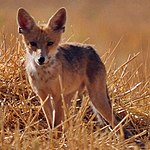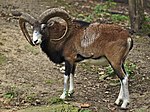LIMSwiki
Contents
The animal name changes in Turkey is the revision of taxonomic nomenclature of three subspecies by the Turkish Ministry of Environment and Forestry. The name changes removed references to Armenia and Kurdistan in the taxonomic nomenclature of subspecies of each animal.[1][2][3][4][5][6][7][8]
History and reaction
The declared taxonomic nomenclature for the three subspecies is effective for the Turkish Environment and Forestry Ministry. According to a statement released by the same ministry on March 4, 2005, the original names were divisive and contradicted "Turkish unity".[9][1][10]
Unfortunately there are many other species in Turkey which were named this way with ill intentions. This ill intent is so obvious that even species only found in our country were given names against Turkey's unity.
Some Turkish officials have said that the original taxonomic nomenclature was intended in bad faith to imply that Armenians and Kurds resided in the areas where the animals lived.[1] However, only the scientific names of the animals were changed.[1]
Andrew Polaszek, the executive secretary of the International Commission on Zoological Nomenclature, the organization responsible for establishing species naming conventions, has said in an interview[10] that acceptance of the revised names would depend upon article publications in scientific journals, but that they were otherwise acceptable from a scientific viewpoint.
Revised taxonomic nomenclature
| Animal | Scientific name | Proposed new name |
|---|---|---|
 |
Vulpes vulpes kurdistanica | Vulpes vulpes |
 |
Ovis armeniana | Ovis orientalis anatolicus |
 |
Capreolus capreolus armenius | Capreolus capreolus capreolus |
These changes currently[when?] affect only official taxonomic nomenclature usage by the Turkish government.
See also
- International Code of Zoological Nomenclature
- Place name changes in Turkey
- Anti-Armenian sentiment in Turkey
- Turkification
- Turkish nationalism
References
- ^ a b c d "Turkey renames 'divisive' animals". BBC: British Broadcasting Corporation. 8 March 2005. Retrieved 26 January 2013.
- ^ Gunaysu, Ayse (March 4, 2009). "Learnings from the Sari Gelin Case". Armenian Weekly. Retrieved 26 January 2013.
- ^ Shahbazi, Shirana; Tehrani, Rachid; Zolghadr, Tirdad; Cone-Miller, Emily; Shahrzad (Artists' group) (2005). Shahrzad: history. JRP Ringier. p. 97. ISBN 9783905701500. Retrieved 26 January 2013.
Turkey Renames Armenian Animals
- ^ Grigoriadis, Ioannis N. (2009). Trials of Europeanization : Turkish political culture and the European Union (1st ed.). New York: Palgrave Macmillan. ISBN 9780230612150.
- ^ Morris, Chris (2006). The new Turkey : the quiet revolution on the edge of Europe (Paperback ed.). London: Granta Books. ISBN 9781862078659. "A species of red fox known as Vulpes Vulpes Kurdistanica will henceforth be plain Vulpes Vulpes, while a species of wild sheep called Ovis Armeniana has been renamed Ovis Orientalis Anatolicus. Foreign scientists, the Ministry noted.. "
- ^ Revue des deux mondes 2006 "L'espèce de moutons appelée Ovis armeniana a été renommée Ovis orientalis anatolicus. De même, le chevreuil dit Capreolus caprelus armenius a été rebaptisé Capreolus caprelus capreolus. « Les noms de ces espèces animales auraient ..." "
- ^ La Recherche Numéros 393 à 398 Société d'éditions scientifiques (Paris, France) - 2006 - Page 96 "Ovis Armeniana devient Ovis Orientalis Anatolicus, Capreolus Capreolus Armenius se transforme en Capreolus Caprelus Capreolus, et Vulpes Vulpes Kurdistanicum, le renard roux du Kurdistan, s'appelle désormais en Turquie Vulpes ..."
- ^ MacDonald, David B. (2008). Identity politics in the age of genocide : the Holocaust and historical representation (1. publ. ed.). London: Routledge. pp. 125–126, 261. ISBN 9780415430616. Retrieved 26 January 2013. "The Ovis Armeniana (wild sheep) is now the Ovis Orientalis Anatolicus, while the roe deer, formerly known as Capreolus Capreolus Armenus, has become Capreolus Cuprelus Capreolus. These previous names have disappeared thanks to ..."
- ^ "Çevre Bakanlığı'nın üniter hassasiyeti". NTV:NTV. 4 March 2005. Retrieved 29 December 2014.
- ^ a b Pyne, Solana. "Taxonomy, Turkish style". Science Now. Archived from the original on 1 July 2013. Retrieved 26 January 2013.

















